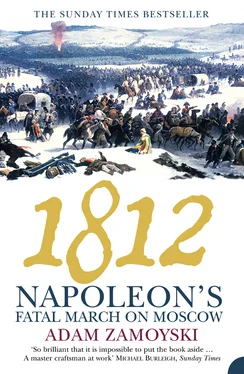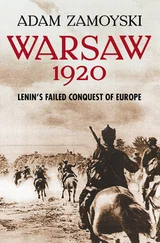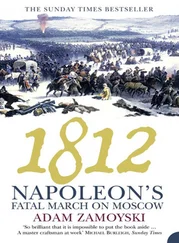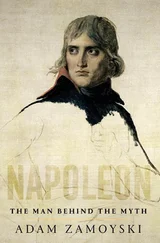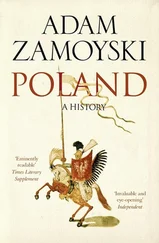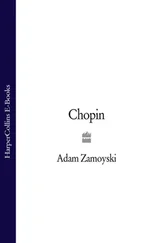He had removed the most obvious points of friction between himself and his people, and pacified the most vociferous centres of opposition. Now it was up to God. At 2 p.m. on 9 April, after attending a solemn service in the monumental new cathedral of Our Lady of Kazan, Alexander left St Petersburg for the army, accompanied part of the way by a crowd of wellwishers who ran alongside his carriage cheering and weeping. He had decided that his place was with his troops.
The Russian army was unlike any other in Europe, and could not have been more different from the French, particularly where the common soldier was concerned. He was drafted for a period of twenty-five years, which effectively meant for life. He was unlikely to serve that term, as no more than 10 per cent survived the dreadful conditions and the frequent beatings – including the practice of making them run the gauntlet of two rows of their comrades beating them as they went – let alone disease or death in battle.
When he was drafted, his family and often the entire village would turn out to see him off, treating the event as a funeral. His family and friends excised him from their lives, never expecting to see him again. As the children of men drafted into the army could not be looked after by working single mothers, they were sent to military orphanages to be brought up and trained to become non-commissioned officers when they grew up. But conditions in these institutions were so poor that only about two-thirds of them survived into adulthood. 17If the conscript were to return after a quarter of a century (with no leave and no letters) he would be a stranger. And he would no longer be a serf, so there was no place for him in the rural economy any more. Those who did last out the twenty-five years would therefore either try to go on serving, or go off to towns looking for work.
When they entered their regiments the conscripts effectively joined a brotherhood, removed from the normal stream of Russian life and bound together by misery. Virtually the only respect in which they had an advantage over their French counterparts was that their uniforms, predominantly green in colour, were more practical and less constricting, as well as better made. In peacetime, their platoon functioned as a trading corporation, an artel , leasing their labour to local civilians, with the profits theoretically being shared out between them, though more often going into the pockets of their officers.
Desertion was difficult within the boundaries of the Russian empire, as an unattached peasant would stick out wherever he went. But when Russian armies were stationed along the western border it became frequent, and many would cross it and take service in the Polish or other forces. When they operated abroad, particularly when they were about to return home, desertion became common, and its scale testified to the misery of military life. In 1807, as they began their march back into Russia after Tilsit, Prince Sergei Volkonsky noted that his regiment, the élite Chevaliergardes, lost about a hundred men in four days, despite doubled sentries posted all around the camp perimeter. 18The men nevertheless behaved with the greatest patriotism and loyalty in the face of the enemy.
Much of the training in the Russian army was directed at good performance on the parade ground rather than on the battlefield. The men were drilled mercilessly and marched about in formation until they learnt to operate as a mass, and taught to rely on the bayonet rather than musketry. In battle, obedience was considered to be a key factor. A special instruction addressed to infantry officers stipulated that on the eve of an engagement they must give their men a talk, reminding them of their duty and that they would be severely punished for any signs of cowardice. Even trying to dodge a cannonball while the unit was standing to was to be punished by caning. If a soldier or non-commissioned officer showed cowardice in the field, he should be executed on the spot. The same went for one who created confusion, by, for instance, shouting ‘We’re cut off!’, as he was to be considered a traitor. 19All these factors conspired to generate solidarity, resilience and the ability to put up with almost any conditions. But they did not breed intelligence or initiative.
The chasm dividing officers from the other ranks was unbridgeable, and there was no possibility of promotion. The officers were drawn exclusively from the nobility. They were supposed to serve their apprenticeship in the ranks, but usually did this in cadet formations or officer schools, and kept contact with their troops down to a minimum. This was not a problem, since many could not sustain a conversation in Russian. But they did personally cane them for minor faults.
The pay of junior officers in the Russian army was lower than anywhere else in Europe. And as promotion to senior ranks was almost entirely dependent on influence at court, junior officers from the minor nobility were sentenced to a life of poverty and obscurity. As a result, such a career only attracted those of meagre talents. The operations of 1805–1807 had shown up grave faults in the command structure of the Russian army, lack of cooperation between units and arms, and other weaknesses, mainly to do with the low calibre and poor training of the officers. But all attempts at addressing these problems were vitiated by the rapid expansion of the armed forces over the next few years, which created a shortage of officers, with the result that in 1808 the length of training was actually cut.
Alexander did everything he could to prepare the army for its next showdown with Napoleon. He created a Ministry of the Armed Forces with the aim of making the army more effective, and lavished money on it. Military spending rose from twenty-six million roubles out of a total budget of eighty-two million at Alexander’s accession to seventy million out of a budget of 114 million by 1814. He raised the draft, which took four men out of five hundred souls in 1805, to five out of five hundred, yielding 100 to 120,000 men each year, which meant that he conscripted more than 500,000 men between 1806 and 1811. In the course of that year 60,000 retired but capable soldiers were brought back into service. The total number under arms in Russia’s land forces increased from 487,000 in 1807 to 590,000 in 1812, and in March of that year an extra draft of two men per five hundred souls yielded another 65 to 70,000 men. By September 1812 the total number of men under arms in the land forces would reach 904,000. 20
In 1803 Alexander had charged General Arakcheev with modernising the artillery. His reforms did not yield fruit in time for the war of 1805, but by the end of the decade it was probably the most professional in Europe. Arakcheev got rid of small-calibre guns, and equipped it with six- and twelve-pounder field guns, and ten- and twenty-pounder ‘ licornes ’, a kind of howitzer. He fitted these guns with the most sophisticated and accurate sights, and made sure that the gunners knew how to use them to best advantage.
The latest reform to see the light of day, in January 1812, was an ordinance for the command of large armies in the field. This laid out clearly who was responsible at every level of command, and gave the commander-in-chief almost unlimited powers in time of war. It also prescribed the channels through which all information should flow up from the furthest outpost to the commander-in-chief and how orders should be transmitted down from him to the company commander. Unfortunately, it was to be almost universally disregarded in the forthcoming campaign, with lamentable results.
The Russian forces in Lithuania were divided into two armies. The First, the stronger of the two, under General Barclay de Tolly, was deployed along the river Niemen in a slight arc almost a hundred kilometres long in advance of Vilna, a position from which it could either move out to attack or mount a defence. The Second Army, under General Bagration, was concentrated like a strike force, ready either to support the advance of the First Army by outflanking any enemy defence, or to ram the exposed flank of any force that attacked the First Army before Vilna. A Third Army, under General Tormasov, guarded the frontier to the south of the Pripet marshes. Exact figures for the strength of these forces are impossible to establish: the conflicting calculations of Russian historians put the total land forces as low as 356,000 and as high as 716,000, with as few as 180,000 and as many as 251,000 effectives in the front line. Most recent studies have been more consistent, but there is some confusion as a result of Russian historians’ habit of breaking down effectives into ‘front-line’ figures and totals, which include all the support services. The myth of the Russians being vastly outnumbered during this campaign has stemmed from the juxtaposition of Russian ‘front-line’ figures with French totals. The strength of the First Army was 127,800 frontline and 159,800 in total, that of the Second 52,000 and 62,000 respectively, and of the Third 45,800 and 58,200, making up a force of 225,000 front-line and 280,000 in total positioned along the frontier, supported by just over nine hundred guns.
Читать дальше
